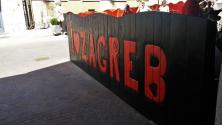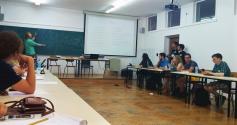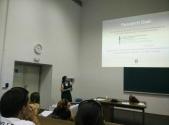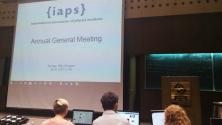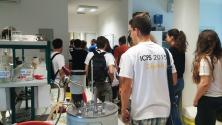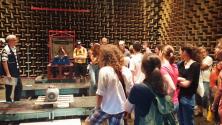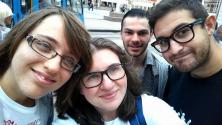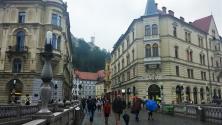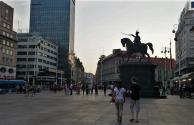International Conference of Physics Students
August 12, 2015 to August 19, 2015
Zagreb, Croatia
By:Amanda Landcastle
SPS Chapter:

The International Conference of Physics Students, or ICPS, is hosted annually by one of the member committees of the International Association of Physics Students, or IAPS. The IAPS is a non-governmental organization that was formed in 1987 by a group of physics students that wanted to create an international environment to support friendly relations between physics students from all over the globe. It is an association run for physics students, by physics students. The ICPS is the main event of the IAPS with hundreds of participating physics students traveling to the conference every year. The conference includes lectures by invited guest speakers, scientific contributions from students, scientific and cultural excursions, and many other events that help to promote networking and scientific intrigue. A somewhat new addition to the ICPS is the Delegate Days, which take place during the two days before the conference. The student representatives of the local and national committees within the IAPS are invited to discuss relevant happenings within the association and to share what has been taking place in their committees. As one of the awardees of the SPS Outstanding Undergraduate Research Award, I was one of the appointed delegates for National Committee (NC) United States. The Society of Physics Students maintains the US involvement in the IAPS every year, opening up all kinds of international opportunities to all SPS members.
I arrived in Zagreb, Croatia on August 9th and spent the day shaking off the jetlag. The commencement of the delegate days wasn’t scheduled until the 11th, so I had some time to adventure around Zagreb and adjust to the incredibly different culture. This was my first time out of the US, so everything was new and exciting to me. Hey, did you know that the neck tie originated in Croatia with the “cravat”? True story.
When the delegate days started, I had to find my new accommodations and learn how to use the tram to get around. I met with the other awardee, Ariel, and we got ourselves situated. I then found myself sitting in a room with physics student leaders from all over the world. I had never been in such a culturally diverse situation before. As I mentioned before, I had never been out of the country. I had never really talked with people from different cultures. I had no idea what to expect. Would I be able to understand them? Would these students understand my humor? Would they have some sort of bias against my culture? I honestly thought that I wouldn’t be able to relate to these students. Here comes a spoiler. Although we all came from different cultures and there were some obvious cultural differences, we were all on the same page. I could understand everyone perfectly and everyone understood my ridiculous humor. I also learned, through a workshop on cultural stereotypes and impressions, that all of us had misconceived ideas of how people from other cultures would act and that as members of an international organization, we need to constantly remind ourselves to respect the cultural norms we come across but not to fall into stereotyping. By the end of the conference, I had made friends from almost every country that participated.
Alright, so I’m sitting in this room with all of these very intelligent students. They were talking about regulations, infrastructures, and what seemed to be so many things that just didn’t have anything to do with me. You see, the IAPS has a lot of European involvement. It’s easier for an international organization to be, well, international, when you can jump in a car and cross a border in an hour or two. Since the IAPS was thriving in Europe, it started to receive a lot of European sponsorship, which just made its role in European countries more prevalent. Because of this, the IAPS has had a difficult time getting involvement from non-European countries, like the US. As the only non-European NC that was participating the delegate days, a lot of the topics being discussed didn’t seem relevant to me. However, I saw how important the IAPS was in the lives of the European physics students. The opportunities that this association can provide students is beyond anything I could have ever imagined. So I decided to make the topics relevant to me, or really, to the US and other non-European countries. During the delegate days, I spoke up when other committees weren’t and I involved the US in the discussion any chance that I had. I then declared my candidacy for an elected position on the Executive Committee of the IAPS. Here is another spoiler. During the Annual General Meeting (AGM), I was elected. The following day I was appointed to the serve as the Vice President and as the Outreach and Education Coordinator for the association.
The conference officially started on the 13th after a welcome party the night before. The opening ceremony took place after breakfast and the first guest lecturer was Branko Grisogono giving his talk on "Some Current and Future Research on Bora Wind". I gave my research presentation during the first student lecture session, and it went splendidly. I was told that my talk was clear and I even had people reciting back to me certain important ideas of my research. The research presentation wasn’t what I expected at all. I didn’t know what the ICPS or the IAPS was when I won this award. I assumed everything would be very formal and that I would have people critiquing everything I said. It was, after all, a huge international conference. Although the student lectures are professional and taken seriously, they are laid back. It was the first time in 4 years of giving research talks that I felt like I was talking to teach people about my research and not just talking to get to the end of my presentation. It was an eye-opening experience.
The week was filled with guest lecturers from all over the world, a night event called “Light Talks” that celebrated the International year of Light, more student lectures and poster sessions, several IAPS workshops, and nightly themes parties. Oh, and a lot of heat. One of the biggest cultural differences that I had to get used to was not having an escape from the constant heat.
The nightly themed parties happen during every ICPS. Among some of the more memorable themes were the costume party and the Croatian party. The national party is the one that participants look forward to every year. Each country gets a table and they bring food and drinks from their country to share with everyone else. You make your way around the room and by the end of the night you have tasted a little piece of each culture. It’s the night that participants are known to get a bit rowdy, but also the night that a lot of new friendships are developed.
The day after the national party, the Annual General Meeting (AGM) took place. During this meeting, the delegates and any individual members of the association vote on regulation changes, event location bids, and many other important points. This year we added the PLANCKS competition to the official documents, we introduced a Code of Conduct, and we voted on where ICPS and PLANCKS will take place in 2017. We also heard updates from the committees of the ICPS and PLANCKS 2016 events. ICPS 2017 will be held in Turin, Italy. PLANCKS 2017 will take place in Graz, Austria. As a reminder, ICPS 2016 will be held in Malta, and the committee is on track to have everything ready on time. PLANCKS 2016 is on track and will be held in Bucharest, Romania from May 20th to May 22nd, 2016. More information on these events can be found on the IAPS website at www.iaps.info.
The day after the AGM, we had excursions scheduled. Every ICPS has scientific and cultural excursions scheduled. This year, participants could participate in excursions like white water rafting, paintball, or visiting a national park. All cultural excursions are paired with a scientific one. I chose to visit and hike the Plitvička Lakes National Park paired with a tour of the KONČAR Electrical Engineering Institute. The National Park was stunning and the KONČAR tour was enlightening and made me realize that there are opportunities for employment in the sciences anywhere in the world.
When the conference ended, I spent a couple of extra days in Zagreb with some Maltese friends that I had met at the conference. We took a bus trip to Ljubljana, Slovenia and we adventured around Zagreb and had a really great time just enjoying the culture, the people, and each other.
SPS gave me this marvelous opportunity to go to a different country to present my research. At least that is what I thought this award was for. I left the US saying “I’m going to Croatia to present my research”. I came back to the US saying “I went to Croatia to present my research, but I also…”. I landed in Chicago with a completely different mindset on culture, networking, leadership, education, and science. I didn’t just present my research in Croatia. The way I look at my research and my role in the sciences has changed. There are no words that I can write to express how strongly I feel about getting physics students involved in SPS and in IAPS. This was an experience that I wouldn’t have had if it wasn’t for SPS. Now, as a member of the Executive Committee of IAPS, it’s my job to make sure physics students all over the world know that the experience that I had could be theirs as well. With all of that said, I would like to thank SPS for everything that they have done for me over the years. I really don’t think I would be the same physicist as I am today if it wasn’t for the SPS community.
Areas of Alignment: Career Resources: Scientific Categories:
